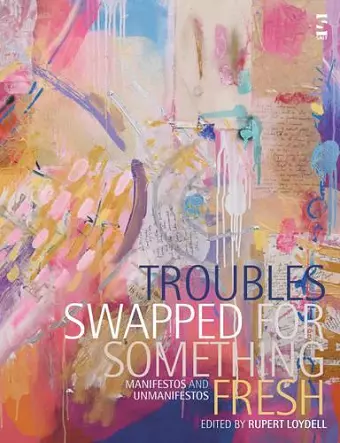Troubles Swapped for Something Fresh
Manifestos and Unmanifestos
Format:Paperback
Publisher:Salt Publishing
Published:29th Jun '09
Currently unavailable, and unfortunately no date known when it will be back

A religion might need its credo, but if in poetry what one believes matters less than what one is willing to ask, then for any manifesto there will be an equal and opposite unmanifesto. Such contention, such discontent and malcontent, animates Troubles Swapped for Something Fresh, in which we are charged to "obey prophetic regions of the skin" but also reminded that "the arteries are wild tonight" -- H. L. Hix Those who feel nostalgia for the avant-garde's heroic days, from Marinetti's caffeinated fetishization of the machine to Debord's revolutionary strollers or even the Language School's more recent politico-linguistic militantism should open this book and listen to the voices of Alan Halsey, Nick Piombino, Sheila E. Murphy, Peter Finch and other writers whose poetico-political preoccupations cannot be ignored. Rupert Loydell's timely anthology offers a broad selection of texts that shows that the art of the manifesto is not dead; it just smells different. -- Michel Delville As a theatrical medium, the manifesto often tends toward an operatic syncretization of the arts, politics, science, and metaphysics. In its interweaving of voices, it is the perfect forum - as Troubles Swapped for Something Fresh reveals - for a breaking of boundaries, for an inerrelationship of experiences. Rupert Loydell's fresh anthology of this ancient form is the perfect expression for all believers, idealists, and the forever young. -- Douglas Messerli
This is a eclectic and exciting gathering of poetry and prose-poems that try to understand what poetry is and who or what it might be for. It is also about what writers might want or demand from poetry, in either a general or personal way.
Troubles Swapped for Something Fresh is a eclectic and exciting gathering of poem and prose-poem manifestos and unmanifestos that try to understand what poetry is and who or what it might be for. It is also about what the authors might want or demand from poetry, in either a general or personal way. Manifestos are often declamatory and incendiary, but I have tried to defuse polemic and overtly dictatorial rhetoric by juxtaposition, and by selecting work from a wide range of critical and poetic positions, not least that of satire and wit.
I’ve previously – as any of my students will tell you – dismissed manifestos, but have more recently found them useful to react against, to incite comment and both critical and poetical reponse with. Rather than read them as a definitive and final statement, I have come to see them as an important part of poetics: a useful way to think about reasons for writing, about processes and techniques one might use to make poetry, and about existing or potential relationships with real or imaginary audiences.
The book is designed to encourage and incite readers to engage with what all too often is regarded as a trivial and occasional art form. I believe, as do many of the other contributors, that poetry is far more than self-expression and heartfelt truth, it is where language is actually rooted and initiallly located; it is where thought itself comes into being. Language is wonderful and intoxicating stuff, an engaging and pliable medium with endless potential for reinvention and recreation. If the reader can find enthusiasm, passion, laughter and deep thought in this book – and then argue and engage with it – I shall be a happy editor. These manifestos and unmanifestos do not add up to a whole, but in their communcal incoherence and difference they challenge and delight.
ISBN: 9781844714711
Dimensions: 246mm x 189mm x 10mm
Weight: unknown
176 pages